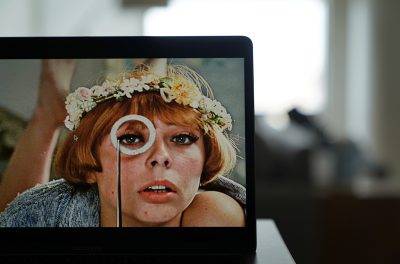In a time when mainstream movie studios strongly value clear-cut storytelling and accessibility to wide ranges of audiences, it’s refreshing to see a film where chaos and unpredictability are at the forefront.
A perfect example of dadaist cinema, films that embrace nonsense and irrationality, would be the Czechoslovak New Wave classic, “Daisies.” Released in 1967 by Věra Chytilová, “Daisies” was a groundbreaking and controversial film for a multitude of reasons.

The opening credits are quite untraditional, with shots bouncing back and forth between modern machinery and aerial footage of warfare. This montage visual style is apparent throughout, and it adds to the frantic pace that this 74-minute movie moves along at.
The two characters are named Marie I and Marie II — names that seem like placeholders for the writers to fill in later. They’re played by non-professional actresses Jitka Cerhová and Ivana Karbanová, who embody these manic and complex characters.
This initial scene introduces us to our protagonists in bikinis sitting beside a pool in black-and-white. They move like puppets controlled by strings, and every movement is accompanied by a creaking sound.
The protagonists conclude that since nobody understands them and everything in the world is so spoiled, they should become spoiled too. Marie I slaps Marie II and we jump cut to an open field. The black-and-white filter disappears as we’re introduced to the vibrant colors that make up the majority of the film.
The ladies then embark on their exciting journey of using rich, creepy old men to get food and other goods. They meet plenty of men throughout the film and leave all of them behind, usually in a dramatically funny fashion.
Marie I tricks an old man into thinking that she’ll board a train with him, before ditching him at the station and joining Marie II. They try the same thing with another man, but he catches on and gets off the train — so the Maries become the ones to hop on and ride away. While another man professes his love over the phone, the Maries cut up sexually suggestive foods and show no interest in the man.
Despite all the humorous things that the Maries say and do, their antics are shrouded in darkness. There’s a suicide attempt, near-death experiences and crying — though that crying is immediately followed by laughing fits. It is unclear whether the girls are ever really happy, and it’s part of the reason why Chytilová describes her movie as, “A philosophical documentary in the form of a farce.”
The movie ends similarly with how it started — with war footage. Overlaying the footage is a real fourth-wall breaker in the form of a dedication statement. It reads, “This film is dedicated to all those whose sole source of indignation is a trampled-on trifle.” This ending quote encapsulates the overarching satire of the film, which is making fun of those in power with immense privilege.
And while movies with similar messages have been made in critique of capitalism and the bourgeoisie, “Daisies” is unique in that the film was made in a communist state. The Czechoslovak Republic nonetheless imposed a ban on the movie, believing it was not a good representation of the state’s views.
The Maries’ extreme overindulgence in material goods was no doubt unaligned with the communist party’s values, but to view this film as solely an anti-communist picture would be selling it short.
“Daisies” is a protest film in every regard, not just politically. The Maries dance in fields, put on heavy makeup and talk to men at restaurants — things that were stereotypical of women to do — but they did so in a way that challenged all conventions of such activities. They would get in the way of a restaurant doing business, rob friendly workers, stuff their faces with food and degrade the men they’re with.
Things don’t really make a lot of sense, and that is the point. The establishment, both in terms of politics and the patriarchy, is the sole cause for the madness of these characters. So everything they do, from their words to their actions to their desires, goes against tradition.
Not only are the characters molded unconventionally, but the director’s stylistic choices are also so unique. The lack of a clear storyline and collage-style moving image, combined with the surrealist imagery and fast pace, makes for a truly anarchic movie.
Chytilová is one of the only female filmmakers in the Czechoslovak New Wave movement, but this dadaist masterpiece remains one of the most radical and flat-out fun movies ever made.
The movie is available to stream with an HBO Max subscription.






















































































































